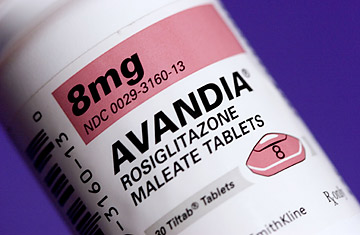
New studies link the diabetes drug Avandia to heart disease risk.
(2 of 2)
Among the Medicare patients, those taking Avandia experienced a 27% higher risk of stroke, a 25% higher risk of heart failure and a 14% higher risk of death than patients taking Actos. The increase in combined risk of death and all cardiovascular events was 18%. The data confirm a previous analysis of the safety of Actos alone: in a 2007 study, also published in JAMA, Nissen reviewed data from 19 trials of the drug and found that it actually lowered patients' risk of heart attack, stroke and death about 18%. In addition, the study showed that Actos can lead to an increase in heart failure but no increase in death.
For the second study, being released Monday by the Archives of Internal Medicine, Nissen conducted a meta-analysis of 56 randomized controlled trials of Avandia published through February 2010. Overall, among the more than 35,500 patients included in the analysis, those taking Avandia had a 28% increased risk of heart attack — but no greater risk of heart-related death — than people taking either placebos or other common diabetes drugs.
Nissen's new study is an update of his landmark 2007 paper, a meta-analysis involving 42 randomized controlled trials, some of which came from GlaxoSmithKline's own database. That study, which included nearly 28,000 patients, found that Avandia led to a 43% higher risk of heart attack and a 64% greater risk of heart-related death than other diabetes drugs or placebos.
Taken together, says Nissen, the data raise serious questions about Avandia's safety. The findings are especially worrisome considering that diabetes patients' fluctuating blood-sugar levels already make them more vulnerable to heart disease, heart attack and stroke. It's not clear exactly why the drug aggravates heart risk, but it is possible that some of the genes activated by Avandia trigger enzymes that cause rupturing of fatty plaques in heart arteries, leading to heart attack or stroke.
The FDA has not taken further regulatory action on Avandia since its 2007 call for a black-box warning. In February, the U.S. Senate released a committee report questioning the drug's safety. The Senators who released the report asked why the FDA had allowed a clinical trial of Avandia to continue even after the agency estimated that the drug caused 83,000 heart attacks from 1999 to 2007. The FDA then launched another review of Avandia's safety data and scheduled the July committee meeting to analyze the existing data.
GlaxoSmithKline said the Senate committee took data out of context from analyses of Avandia and that existing data show that Avandia does not increase patients' overall risk of heart events or death. "We look forward to participating in a rigorous scientific discussion of the data on the cardiovascular safety of Avandia with the FDA advisory committees on July 13 and 14," the company said in a statement.
However, given the evidence that other drugs in the same class, such as Actos, control blood sugar equally well without the risk to the heart — or may even be cardioprotective — Nissen argues that doctors should no longer prescribe Avandia. "I can't understand why any doctor would continue to use this drug rather than pioglitazone when a 19-trial meta-analysis shows that pioglitazone reduces the risk of heart attack, stroke and death," he says.
Nissen says he has switched many of his patients from Avandia to Actos without any adverse effects. That is the strategy supported by the American Diabetes Association, which advises patients against the use of Avandia.
